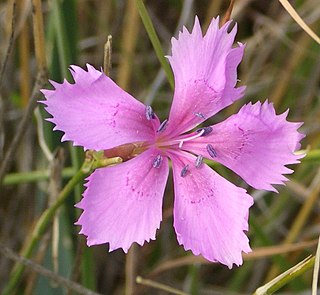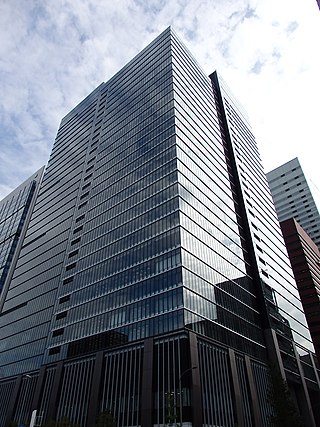
Dianthus caryophyllus, commonly known as the carnation or clove pink, is a species of Dianthus. It is likely native to the Mediterranean region but its exact range is unknown due to extensive cultivation for the last 2,000 years.

Fujifilm Holdings Corporation, trading as Fujifilm, or simply Fuji, is a Japanese multinational conglomerate headquartered in Tokyo, Japan, operating in the realms of photography, optics, office and medical electronics, biotechnology, and chemicals.

Suntory Holdings Limited is a Japanese multinational brewing and distilling company group. Established in 1899, it is one of the oldest companies in the distribution of alcoholic beverages in Japan, and makes Japanese whisky. Its business has expanded to other fields, and the company now also makes soft drinks and operates sandwich chains. With its 2014 acquisition of Beam, Inc., it has diversified internationally and become the third largest maker of distilled beverages in the world. Suntory is headquartered in Dojimahama 2-chome, Kita-ku, Osaka, Osaka Prefecture. Suntory Beverage & Food Limited, a subsidiary of Suntory, is responsible for development outside Japan.
Flavr Savr, a genetically modified tomato, was the first commercially grown genetically engineered food to be granted a license for human consumption. It was developed by the Californian company Calgene in the 1980s. The tomato has an improved shelf-life, increased fungal resistance and a slightly increased viscosity compared to its non-modified counterpart. It was meant to be harvested ripe for increased flavor for long-distance shipping. The Flavr Savr contains two genes added by Calgene; a reversed antisense polygalacturonase gene which inhibits the production of the aforementioned rotting enzyme and a gene responsible for the creation of APH(3')II, which confers resistance to certain aminoglycoside antibiotics including kanamycin and neomycin. On May 18, 1994, the FDA completed its evaluation of the Flavr Savr tomato and the use of APH(3')II, concluding that the tomato "is as safe as tomatoes bred by conventional means" and "that the use of aminoglycoside 3'-phosphotransferase II is safe for use as a processing aid in the development of new varieties of tomato, rapeseed oil, and cotton intended for food use." It was first sold in 1994, and was only available for a few years before production ceased in 1997. Calgene made history, but mounting costs prevented the company from becoming profitable, and it was eventually acquired by Monsanto Company.

The Takeda Pharmaceutical Company Limited[takeꜜda jakɯçiŋ koꜜːɡʲoː] is a Japanese multinational pharmaceutical company, with partial American and British roots. It is the largest pharmaceutical company in Asia and one of the top 20 largest pharmaceutical companies in the world by revenue. The company has over 49,578 employees worldwide and achieved US$19.299 billion in revenue during the 2018 fiscal year. The company is focused on oncology, rare diseases, neuroscience, gastroenterology, plasma-derived therapies and vaccines. Its headquarters is located in Chuo-ku, Osaka, and it has an office in Nihonbashi, Chuo, Tokyo. In January 2012, Fortune Magazine ranked the Takeda Oncology Company as one of the 100 best companies to work for in the United States. As of 2015, Christophe Weber was appointed as the CEO and president of Takeda.

Dianthus is a genus of about 340 species of flowering plants in the family Caryophyllaceae, native mainly to Europe and Asia, with a few species in north Africa and in southern Africa, and one species in arctic North America. Common names include carnation, pink and sweet william.
The term modifications in genetics refers to both naturally occurring and engineered changes in DNA. Incidental, or natural mutations occur through errors during replication and repair, either spontaneously or due to environmental stressors. Intentional modifications are done in a laboratory for various purposes, developing hardier seeds and plants, and increasingly to treat human disease. The use of gene editing technology remains controversial.

Kirin Brewery Company, Limited is a Japanese integrated beverages company. It is a subsidiary of Kirin Holdings Company, Limited. Its major operating units include Kirin Brewery Company, Limited, Mercian Corporation and Kirin Beverages Company, Limited. Kirin is a member of the Mitsubishi Group.
Fujifilm Business Innovation Corporation is a Japanese company that develops, produces and sells xerographic and document-related products and services in the Asia-Pacific region. A wholly-owned subsidiary of photographic firm Fujifilm Holdings, its headquarters are in Midtown West in Akasaka, Minato, Tokyo.

A blue rose is a flower of the genus Rosa that presents blue-to-violet pigmentation instead of the more common red, white, or yellow. Blue roses are often used to symbolize mystery or the unattainable, since they do not exist in nature because of genetic limitations. In 2004, researchers used genetic modification to create roses that contain the blue pigment delphinidin.

Showa Denko K. K., founded in 1939 by the merger of Nihon Electrical Industries and Showa Fertilizers, both established by a Japanese entrepreneur Nobuteru Mori, is a Japanese chemical company producing chemical products and industrial materials.
Maxygen Inc. was a biopharmaceutical company focused on developing improved versions of protein drugs using DNA shuffling and other protein modification technologies. The company was headquartered in Redwood City, CA. It dissolved in 2013. The Maxygen legacy was revived in 2018 with a focus on Directed Evolution of Proteins using Molecular Breeding. Maxygen LLC is currently headquartered in Sunnyvale, CA.

Genetically modified plants have been engineered for scientific research, to create new colours in plants, deliver vaccines, and to create enhanced crops. Plant genomes can be engineered by physical methods or by use of Agrobacterium for the delivery of sequences hosted in T-DNA binary vectors. Many plant cells are pluripotent, meaning that a single cell from a mature plant can be harvested and then under the right conditions form a new plant. This ability is most often taken advantage by genetic engineers through selecting cells that can successfully be transformed into an adult plant which can then be grown into multiple new plants containing transgene in every cell through a process known as tissue culture.

Rakuto Kasei is a Japanese multinational chemicals company, with their headquarters in Otsu City, Japan and offices in Yokneam, Israel. They produce chemical products, including animal feed additives, dishwashing detergent, fertilizer, and color deepening agents for blue jeans.

Kyowa Kirin Co., Ltd. is a Japanese pharmaceutical and biotechnology company under the Kirin Holdings, and is among the 40 largest in the world by revenue. The company is headquartered in Chiyoda-ku, Tokyo and is a member of the Nikkei 225 stock index.

Lupin Limited is an Indian multinational pharmaceutical company based in Mumbai. It is one of the largest generic pharmaceutical companies by revenue globally. The company's key focus areas include paediatrics, cardiovascular, anti-infectives, diabetology, asthma and anti-tuberculosis.

Garden roses are predominantly hybrid roses that are grown as ornamental plants in private or public gardens. They are one of the most popular and widely cultivated groups of flowering plants, especially in temperate climates. An enormous number of garden cultivars have been produced, especially over the last two centuries, though roses have been known in the garden for millennia beforehand. While most garden roses are grown for their flowers, often in dedicated rose gardens, some are also valued for other reasons, such as having ornamental fruit, providing ground cover, or for hedging.
Biotechnology in India is a sunrise sector within the Indian economy. Agencies of the Government of India concerned with the biotechnology industry include the Department of Biotechnology and the proposed Biotechnology Regulatory Authority of India. As of 2022, the sector is valued at $80 billion. The Indian biotechnology sector is fast growing, and the sector is expected to be valued at $150 billion by 2025 and surpass $300 billion in value by 2030.

Blue flower colour was always associated with something unusual and desired. Blue roses especially were assumed to be a dream that cannot be realised. Blue colour in flower petals is caused by anthocyanins, which are members of flavonoid class metabolites. We can diversify three main classes of anthocyanin pigments: cyaniding type responsible for red coloration, pelargonidin type responsible for orange colour and delphinidin type responsible for violet/blue flower and fruits coloration. The main difference in the structure of listed anthocyanins type is the number of hydroxyl groups in the B-ring of the anthocyanin. Nevertheless, in the monomeric state anthocyanins never show blue colour in the weak acidic and neutral pH. The mechanism of blue colour formation are very complicated in most cases, presence of delphinidin type pigments is not sufficient, great role play also the pH and the formation of complexes of anthocyanins with flavones and metal ions.

Orange petunias or A1-DFR petunias are genetically modified organisms which contain a transgene from maize that colors the petunia flowers orange. First created in a 1987 experiment at the Max Planck Institute for Plant Breeding Research in Cologne, the petunias were subsequently released into the wild but were not commercialized. In 2015 orange petunias were discovered in Helsinki by botanist Teemu Teeri, leading to a regulatory response dubbed the petunia carnage of 2017 in which plant sellers were directed to destroy the modified petunia plants rather than sell them. The United States Department of Agriculture approved the sale of orange petunias in the United States in January 2021.














